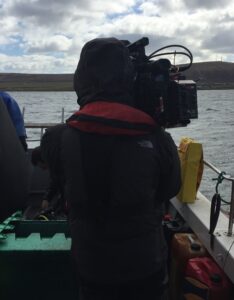
I’ve been working with another television company and it has got me thinking about some of the ways in which we participate in the presentation of archaeology to the public. This particular production has resulted in one or two people commenting that I am getting involved with the sensationalist and downmarket. They find it surprising that I would agree to be involved. So, of course, I feel obliged, even if only in my own mind, to justify my participation. And that got me thinking more generally.
In short, I don’t feel that it would be right to be snobbish about to whom, and indeed how, I might interpret archaeology. It would be dreadful to say that we were happy to be quoted in ‘middle-class broadsheet papers’ but not in the tabloids. The same applies to all other media: books; television; radio. My personal bottom line is that I would not say anything on air that I believed to be factually incorrect, or a real stretch of the interpretation. But even that gets me wondering.
When I work with a prospective author on the text for an archaeological novel, I don’t have to like the text. The story-line is none of my business, that is up to them. All I need to do is fact check the archaeology and help them out with reading material and the clarification of interpretations. And yet, with regard to a television programme, the tendency is to take it much more personally. I wonder why this is. Is it just because the inclusion of my face makes it seem more individual?
No matter what the reason, I feel that we do need to support all television, not just ‘intellectual’ programmes or channels. And indeed all aspiring novelists, journalists and others. Only by doing that can we hope to ensure that the archaeological content makes use of details that we, as a profession, consider valid. If we don’t, we can’t complain when popular output wanders from the archaeological track. So, I feel, somehow, that we need to take a step back from the output. After all, the experts in producing popular content are, usually, those who are making it. I’m very aware that when I advise a team on possible content, I approach it as if I am building my case in an academic paper. But that does not always work well on air. Television does, sometimes, make great leaps of faith. So do novels, films and other media. There can be gaps, irrelevant detail, or overkill – in our eyes. But we are, mostly, archaeologists, not producers or novelists.
I’m going to continue to work with those who wish to interpret archaeology to the public. I’m going to continue to try to help them out with information, and point them in the direction of colleagues who might also be able to help. And I’m going to continue to work on distancing myself from the stories that they choose to tell. Some, I will like, others I might not. I hope that I will be able to do this across an increasing range of media and organisations. We need archaeology to be embedded into everyday life across twenty-first century society. The end result will, no doubt, vary. But at least I will know that I gave it my best shot.
And, to be honest, it is a lot of fun.
You must be logged in to post a comment.